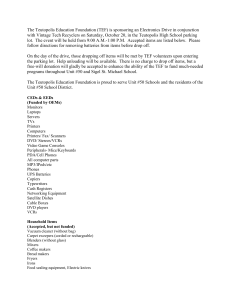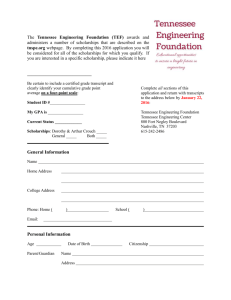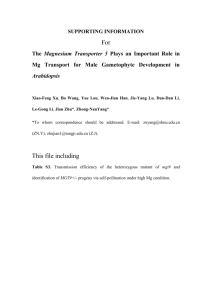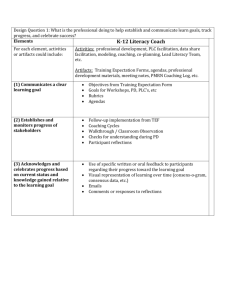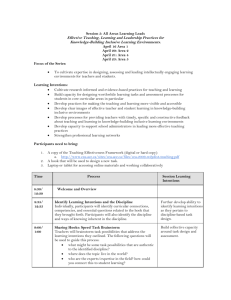American Business and Public Education
advertisement
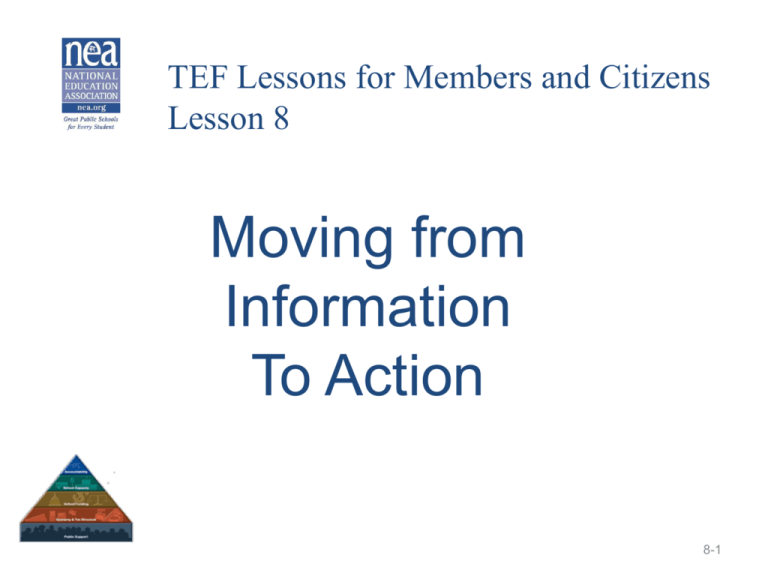
TEF Lessons for Members and Citizens Lesson 8 Moving from Information To Action 8-1 Objective: Participants will: • Explore state affiliate TEF activities, • Examine a template for starting a campaign, and • Develop a state and/or local action plan. 8–2 As a group can we agree that we will: 1) Respect and value differences of opinions and varying levels of knowledge 2) Be attentive 8–3 Question: What do the following have in common? • • • • • The weekend The 8-hour work day The 40-hour work week The minimum wage Laws prohibiting child labor 8–4 Answer: • All are the direct result of people organizing collectively, through a union, to establish rules and policies that address economic inequality and maintain fairness. • Are these things society sometimes takes for granted? 8–5 POWER 8–6 Why Is this Our Business? • • • • • It’s about our students. It’s about our community. Education represents roughly 1/3 of the state budget. We have clout. Educators represent a significant and sizable voting block. • Educators have power (if we choose to use it). With the Union/Association’s representative councils, we are one of the best organized groups in the United States. 8–7 Why THIS IS Our Business. • Teachers consistently poll as one of the most — if not the most — trusted voices within a community. – You are the best messenger. • We need to educate our colleagues, our leaders, and the general public. – Who is better equipped to do this than you? 8–8 What’s Happening Around the Country? A number of state education associations are proactively taking steps to address these issues, and fight back against the destructive impact of the privatization/deregulation/shrink the size of government campaign… Activities include: – – – – Building membership organizing campaigns on TEF issues Fighting to close corporate tax loopholes Educating policy makers on TEF issues Winning public regard by exposing the pitfalls of giving away corporate subsidies in the name of economic development 8–9 What’s Happening Around the Country? Building membership organizing campaigns on TEF issues State education associations are embarking on pilot projects to recruit and engage members through raising their awareness of TEF issues and how it affects their ability to do their jobs as well as the quality of their students’ education. 8–10 What’s Happening Around the Country? Education state policy makers on TEF issues State education associations are currently organizing TEF Forums for Policy Makers, with an eye on the 2012 legislative sessions and beyond. 8–11 What’s Happening Around the Country? Fighting to close corporate tax loopholes A number of state education associations are on the offensive, challenging states to Close Corporate Tax Loopholes First! before cutting education budgets, rolling back teacher salaries and benefits, or causing class sizes to balloon. 8–12 What’s Happening Around the Country? Fighting to close corporate tax loopholes NEA Research has developed a Close Corporate Tax Loopholes First! Toolkit It can be accessed here, on InsideNEA: https://insidenea.nea.org/NEABiz/ResearchInfo/Documents/Close Tax Loopholes First For Education.pdf 8–13 What’s Happening Around the Country? Fighting to close corporate tax loopholes ASKING QUESTIONS. 8–14 8–15 GETTING ANSWERS. What’s Happening Around the Country? Fighting to close corporate tax loopholes GETTING ANSWERS. 8–16 What’s Happening Around the Country? Fighting to close corporate tax loopholes In 2003 Exxon made $89 million in Alabama and paid zero income tax. TAKING NAMES. •They deducted $418 million in payments to themselves. •They deducted 6 times the Federal Depletion allowance. •Deducting 6 times the Federal Depletion Allowance allows Exxon to deduct more than the oil and gas is worth. 8–17 MAKING A LIST. 8–18 What’s Happening Around the Country? • The Oregon Education Association led in getting ballot initiatives approved by the voters to raise the minimum taxes paid by corporations while adding a new tax rate for household incomes above $250,000. 97.5% of Oregon taxpayers pay no more, and 88% of businesses will pay only the $150 minimum. http://www.voteyesfororegon.org/ • The Colorado Education Association has used TEF issues in its community outreach and coalition building aimed at the significant tax reform necessary to fund education and build a better Colorado. www.believeinabettercolorado.org 8–19 What’s Happening Around the Country? In Illinois, where the state Constitution requires that any income tax be a flat tax, resulting in a huge burden on low-income taxpayers, the Illinois Education Association has launched an effort to amend the state constitution to allow for a progressive income tax, so that the state may adequately fund education and other needed services without undue burden on working families. 8-20 What’s Happening Around the Country? The Michigan Education Association has, as part of its Investing in Michigan’s Future campaign, earned well-deserved accolades as a responsible steward of public tax dollars by commissioning several studies on the effectiveness of subsidies given as part of state economic development programs. Some programs were found to actually reduce jobs resulting in less revenues for state and local governments. Legislative fixes have been introduced and enacted. http://www.mea.org/investing/ 8-21 THINK—JOURNAL 8–22 1. Thinking about the changes that are needed in your state and local to address these issues, what changes can you envision that would make the most difference in your students’ lives? What would those changes look like? 8–23 2. What would you have to let go of to bring this vision into reality? What would you do to begin? 8–24 3. Who are the core partners and helpers that would help you bring it into reality and that could support you in these efforts? 8–25 4. If you committed to taking on the project of bringing your intentions into reality, what practical steps could you take in the next three to seven days? 8–26 Your Steps and Moving Forward Together A Template 8–27 TEF Tools and Resources TEF Website: http://www.nea.org/tef 1 Publications Studies supporting TEF concepts: • The Effects of State Public K-12 Expenditures on Income Distribution • K-12 Education in the U.S. Economy • Protecting Public Education from Tax Giveaways to Corporations. • School Funding, Taxes and Economic Growth • TEF Series Why invest in education makes sense: Enriching Children, Enriching the Nation Corporate abuse: The Great American Job Scam - corporate tax dodging and the myth of job creation. Your Tax Dollars At Work…Offshore - foreign outsourcing firms are capturing state government contract. No More Secret Candy Store - A grassroots guide into investigating corporate subsidies. 2 State-Specific Data Sources States Facing Budget Shortfall – Center for Policy and Budget Priorities (CBPP) reports state fiscal profiles. State-by-state tax news and policy analysis provided by the Institute of Economics and Policy Analysis (ITEP). Economic Policy Institute’s (EPI) new report analysis rank states by overall unemployment as well as the change seen since the start of the recession in December 2007. Enriching Children, Enriching the Nation show state returns in budget, salary, crime reduction by investing in Pre-K thru 12. Find out how much Wal-Mart is costing your state in subsidy deals, healthcare cost, and property tax appeal appeals. Combined Reporting, How Does Your State Stack-Up? Institute on Taxation and Economic Policy (ITEP) This reporting requires multi-state corporations to report the income earned by both the parent corporation and all of its subsidiaries and to determine their income tax liabilities on that basis. Good Jobs First state-by-state corporate subsidy websites. 3 State affiliates in TEF Action A few examples… This video address from Alabama EA President, John Wright. Alabama EA sheds light on corporate tax avoidance in Alabama Detroit News, Friday, July 25, 2008 MEA Press Release: Drop-outs One Too Many, April. 4, 2008 Honolulu Advertiser, Dec, 2006 Honolulu Advertiser, Feb. 2007 Iowa State EA News Article Kentucky EA - School Funding Statement. Michigan’s Business Tax Incentives: A study commissioned by MEA and NEA to improve the quality of the debate on business tax incentives. Mississippi EA op-ed piece. State Affiliate TEF Websites: Colorado, Illinois, Michigan, Mississippi, New Jersey, Oklahoma 8–28 TEF Tools and Resources TEF Website: http://www.nea.org/tef 4 Customizable Tools Community Organizing • Business Outreach Sample Political Action Tools • • Corporate Legislation TEF Model Legislation 5 Other Useful Links 6 Introducing a New TEF Interactive Tool NEA Information on establishing a social networking site to use as an organizing tool. Others are: (http://www.ning.com/ ) and (http://www.groupsite.com/) http://www.faireconomy.org/tfoc to locate your state’s tax fairness organizing collaborative. These groups are located in 21 states. www.nea.org/tef 8–29 Other Resources 7 On Taxes… Videos PBS Now, "Taxing the Poor" ((26.03) Wal-Mart Subsidies (7:48) Warren Buffett's Tax Rate is Lower than His Secretary's (4:39) TAXES: Warren Buffett - Rich Taxed Too Little, Poor Too Much (5:17) Eye To Eye With Katie Couric: Buffett's Tax Code (CBS News) (1:40) 8 On Economic Policies Videos U.S. PIRG on Countdown. Olbermann talks about U.S. PIRG's report "Tax Shell Game.” Free Lunch, Corp Welfare, Bill Moyers and David Cay Johnston (9:49) David Cay Johnston - A History of Government Subsidies (3:08) 9 Funding for Schools Access Quality Education: School Funding Litigation A National Network of Advocates Involved in Education Finance Litigation, Abbott vs. Burke is the New Jersey Supreme Court ordered a set of education programs and reforms widely recognized to be the most fair and just in the nation. David Cay Johnston - Are Government Subsidies Unfair? (4:43) David Cay Johnston - A Moral Argument for Progressive Taxes (3:04) 8–30 “Knowledge without action leads to despair.” — Anonymous “Never doubt that a small group of thoughtful, committed citizens can change the world. Indeed, it's the only thing that ever has.” — Margaret Mead “You see things; and you say, ‘Why?’ But I dream things that never were; and I say, ‘Why not?’ ” --- George Bernard Shaw 8–31 “Our lives begin to end the day we become silent about things that matter.” — Martin Luther King, Jr. 8–32
